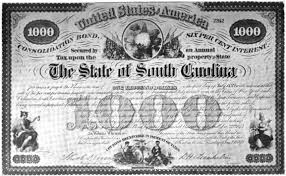Readers Question: Since the debt is mainly in the form of government bonds or gilts then it can only be paid back when the term of the bond terminates. What happens if there is not enough money to pay this back?

Government bonds are a method for the government to borrow money. They sell bonds (e.g. for £1,000) and promise to pay back the bond holder in say 30 years. In the meantime, they will pay an interest rate of e.g. 5% a year as compensation.
Default on debt. If the government has no money to pay bond holders, then it will be defaulting on its debt. Bond holders lose their investment.
The government will be reluctant to do this because once it has started to default on its debt – no-one will want to buy or hold government bonds – so you will see the price of government bonds fall, and the market interest rate rise. The government will have to pay much higher interest rates to compensate for the risk of default and it will be difficult to attract buyers of bonds in the future.
Haircut / partial default. If the government is in great financial difficulty it may offer a deal to bond holders that it will pay back a certain percentage, e.g. 50%. In response for writing off 50% of the bond, bondholders may feel it is better to get 50% than nothing. Alternatively, the government may extend the maturity of the bond, e.g. change a 30 year bond into a 45 year bond, to give itself more time to pay it back.
Money creation If there is a Central Bank, the bank can create money in order to be able to pay the bond holders. In periods of uncertainty, having a Central Bank to act as lender of last resort can help provide liquidity and avoid rising interest rates. However, depending on the economic circumstances, there is a limit to how much money the Central Bank can create without causing inflation and other economic problems associated with high levels of inflation.
Deliberate inflation. However another option is to deliberately print money enough money to create inflation. High rates of inflation will reduce the real value of the outstanding bonds making it very easy for the government to pay it back.
This is really defaulting by inflation and again, if bondholders see that the value of bond is reduced by inflation, they will be reluctant to buy in the future.
Borrow from IMF. If the government is in financial difficulty it could try and borrow from an international organisation like the IMF (e.g. UK in the 1970s). The IMF may offer a loan for the government to stay afloat in international bond markets, but the loan will usually come with conditions, such as cutting government spending and supply side reforms.
Cut back on government spending. If the government needs to borrow and it can’t. The government could immediately freeze / stop some forms of government spending. For example, it could stop paying welfare benefits or wages. This, of course, would be highly politically unpopular.
Related pages

This explananation should come with a warning that the author prays at the altar of a big nanny government. A more balanced, explanation would also state:
INFLATION can easily make goods and services too expensive for the poor, possibly for generations to come.
CUT BACK ON GOVERNMENT SPENDING. This can be easily done by cutting the bloated salaries, inefficiencies and misallocation of funding for which governments have been reknowned throughout history.
I’m glad you kept the explanation clear and on point. Not too much fluff like other writers.